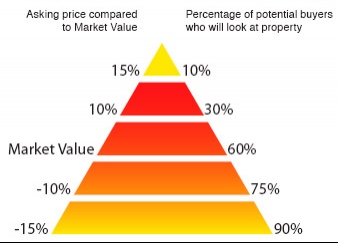Frequently Asked Seller Questions
Sellers Frequently Asked Questions:
As a seller, you have to understand how the market works, or you risk selling for less than you might have. Here are important questions on the minds of many sellers. Feel free to Contact Us with any others.
- When’s a good time to sell my home?
- Should I buy first or sell first?
- What’s a CMA?
- What is a FSBO?
- Do I have to put a For Sale sign on my lawn?
- Is a public open house really necessary or effective?
- Can I restrict showings to meet my schedule?
- Is it safe to have a lockbox on my house during showings?
- If my house doesn’t sell within a specified time, can I take it off the market and put it back on later?
- Why is the period between listing and offers so short?
- If the buyer doesn’t have a certified cheque, should I still accept his offer?
- Should I consider offers on a certain date or look at them as they come in?
- Do you recommend staging my home before putting it on the market?
- Do I have to spend a lot of $ renovating or can I sell my home as-is?
- What is a pre-sale home inspection, and should I get one?
- If my home is for sale with you, how will I know how things are really going?
- Will agents showing my home treat my home with respect?
- Should I be present for showings to show prospective buyers all the special features of my home?
- If I price my home high, can’t we always work our way down from there?
- What is my home really worth?
- What are homes going for in my neighbourhoo
- What’s a CVA
- What is an SPIS?
- When’s a good time to sell my home?Currently we’re in a sellers’ market, which means that the number of qualified buyers exceeds the available inventory of homes for sale…so now’s a great time to sell your home! There are many other factors such as seasonality, availability comparable homes for sale, new by-laws and even weather, that can come into play. We’ll evaluate the best time to sell your home and present you with all your options so you can make an informed decision on when to sell.
- Should I buy first or sell first?It isn’t necessary to have the proceeds of the sale of your home in hand to buy a new one – your mortgage broker can explain bridge financing and other options to you. In our experience, when your home sells, you will find the right one. And you’ll be one step ahead of the great majority of buyers out there. You will have been working with a Realtor® to sell your home, so you’ll have gained a tremendous edge – knowledge of the market.
- What’s a CMA?A Comparative Market Analysis is a comprehensive report we provide to clients who are thinking about selling, detailing the recent area market activity using the most up to date statistics. It provides the basis for an accurate suggested listing price designed to sell your home for the best price the market will bear.
- What is a FSBO?For Sale By Owner is always an option! It involves your selling your home on your own, without using a real estate professional. While we don’t recommend undertaking this complicated, expensive process on your own, we will be happy to send you a free report of do’s and don’ts when selling your home by yourself.
- Do I have to put a For Sale sign on my lawn?We recommend it! You’d be surprised how many people contact us for more information after just driving by the house. It also gives the locals a chance to put the word out about your selling. Finally, we attach colourful, informative flyers to an info-box on your sign to get interested parties excited about the amazing features inside & letting them know how to get in touch.
- Is a public open house really necessary or effective?We recommend it! We have definitely seen deals come through from interested parties who attended the open house. While an open house alone is an insufficient marketing strategy, it’s an important part of the overall marketing plan – generating a buzz of interest over the property and minimizing hassle to you by giving everyone a concentrated opportunity to visit your home.
- Can I restrict showings to meet my schedule?Of course – with one caveat: your home will typically be on the market for less than one week prior to considering offers, so you don’t want to make it too difficult for prospective buyers to make an appointment to see your home. A common restriction is ‘no showings after 9 pm’. You can also request a certain amount of notice prior to showings so you can adjust your schedule accordingly.
- Is it safe to have a lockbox on my house during showings?Access via lockbox is certainly the industry standard and allows prospective buyers to easily see your home. The code to your lockbox is only released by our office to real estate agents and skilled professionals we have worked with for a long time (i.e. home inspectors, photographers etc.) to minimize any risk to you. Prospective buyers are always accompanied by their agents and do not have direct access to your home!
- If my house doesn’t sell within a specified time, can I take it off the market and put it back on later?Yes! While all our efforts are geared to a quick, smooth sale, that doesn’t always happen. If your desired price is not achieved or you change your mind for any reason, let us know and we can suspend or cancel our listing agreement and re-list the house at a strategic time.
- Why is the period between listing and offers so short?Good question! In today’s market, sellers often choose to ‘hold back’ offers till a certain date, usually only 5-7 days after it goes on the market. Far from this being insufficient time for buyer to view the property, it actually provides an opportunity for agent inspection, weekend open house(s), and creates a feeling of scarcity and call to action for buyers who must put in an offer by a certain date or lose out. It works!
- If the buyer doesn’t have a certified cheque, should I still accept his offer?Many factors come into play during the negotiations of offers. We will look at the pros & cons of each offer together so you have all the facts to make an informed decision. A certified cheque is not mandatory, so there will be situations where you’ll need to choose between a personal cheque and a certified one. That’s when other factors like price, closing date & conditions will need to be weighed against deposit issues!
- Should I consider offers on a certain date or look at them as they come in?We will discuss this depending on your property’s unique situation. More and more it is standard to accept all offers on a certain date rather than looking at them whenever someone makes an offer – buyers may think there is no urgency if they can offer anytime, and thus aren’t as motivated to offer. If a buyer wishes to place an offer before your offer date, we will definitely let you know!
- Do you recommend staging my home before putting it on the market?As part of my thorough consultation with you, I’ll recommend certain repairs, fixes and renovations that would make your home more saleable, as well as common-sense prep such as de-cluttering and cleaning. However, we rarely recommend professional staging – it just doesn’t seem necessary in most cases, with the possible exception of some estate or income property sales. We do have a list of recommended stagers that we can provide if you are interested in hiring a stager for your home!
- Do I have to spend a lot of $ renovating or can I sell my home as-is?We will recommend certain basic repairs & fixes, along with cleaning, decluttering, and the tradespeople we trust to help you achieve this – but certainly big renovations are beyond many sellers’ desired goals! When pricing your property competitively, I will let you know my expert opinion of what your home’s market value would be if you did the big reno or simply spruced your home up.
- What is a pre-sale home inspection, and should I get one?Pre-sale home inspections are becoming more and more common and they help prevent the sale of your home ultimately being conditional on the buyer obtaining his or her own inspection. Basically, you hire an experienced professional home inspector to inspect your home and provide a detailed summary of its condition, including all major interior & exterior systems. The cost to you is about $400 and the inspection is now available to all prospective buyers, affording them great knowledge & peace of mind as there will be no unpleasant secrets after they purchase it.
- If my home is for sale with you, how will I know how things are really going?Our mandate is to keep you in the loop on everything that’s going on behind the scenes during the sale process. We follow up with every agent who has showed your property to get their clients’ feedback, as well as reporting to you about the success of the agents’ and public open houses and any phone calls or emails of interest we have received. That way it won’t be a total guessing game as to what’s going to happen on offer night. Statistically speaking, we sell houses significantly faster and for significantly more $ than the TREB average!
- Will agents showing my home treat my home with respect?Absolutely. Agents are subject to the Real Estate Council of Ontario’s Code of Ethics designed for your protection, among other rules and regulations. To help further safeguard your home, we will ask you for the showing instructions that are important to you – such as ‘please remove your shoes’ or ‘don’t let the cat out’ and these will be sent to every agent showing your home, and we will place the appropriate signage at the house as a reminder to those showing, to ensure your home’s systems are kept as you’d like them.
- Should I be present for showings to show prospective buyers all the special features of my home?We have found that buyers prefer the privacy of being able to see your home and discuss it openly amongst themselves & with their agent, without the pressure of a seller being present. Your home’s amazing features will speak for themselves, along with the detailed, attractive marketing materials we will prepare for you. Any questions the buyers have will go through their agent to us and we will have the added benefit of following up on their interest.
- If I price my home high, can’t we always work our way down from there?This is a very common question – unfortunately, the market isn’t based on what you want to net for your home, it’s based on what buyers will pay for it! Pricing high puts you at a definite disadvantage. Those who can’t afford to go that high won’t even see your home on the MLS®; overpriced homes attract significantly less interest, and the longer they stay on the market, the worse the stigma. After reducing your price to fair market value, prospective buyers may now think you are desperate to sell and low-ball an offer significantly lower than what you want to net! All things considered, correct pricing is key to the sale of your home..
- What is my home really worth?In my free expert home evaluation, I’ll take several factors into account such as comparable sales in the neighbourhood, similar available & sold properties, and your home’s distinctive features to arrive at an opinion of value supported by data and my knowledge of your neighbourhood. Together we’ll decide on a price in this range of values that will give your home a competitive edge.
- What are homes going for in my neighbourhood?Just let us know where you live and we can send you this information – it’s always good to do your homework so you’ll be up to speed on local market developments!
- What’s a CVA?A Current Value Assessment is what the Municipal Property Assessment has valued a property at for the purpose of calculating property tax. It may or may not be close to the actual market value of the property.
- What is an SPIS?A Seller Property Information Statement is an optional form that sellers can fill out when listing their homes. The seller warrants as to certain information pertaining to their home, such as their knowledge of any structural problems, details on mechanical systems and upgrades etc. If you are interested in a specific property we can let you know if there is an SPIS available and send it to you.





 positive moving experience.
positive moving experience.